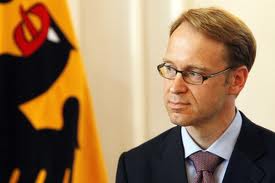 Head of the Bundesbank, Jens Weidmann
Head of the Bundesbank, Jens Weidmann
The Slog has learned from Washington sources that German central bank President Jens Weidmann ‘will do everything in his power’ to stop any Bundesbank funds being used to create more ‘firepower’ in the fight to stop massive banking failures as and when Greece defaults.
For those who’ve been following Weidmann’s history, and his recent statements at the G20, his implacable opposition to the Geithner recapitalisation plan (as currently outlined) will come as no surprise.
“Stimulus financed by increasing the budget deficit in Germany is not appropriate,” Weidmann told reporters in Washington last Friday, “The capital situation among German banks is better than it was in 2008 during the financial crisis, and undifferentiated calls for more bank capital are not helpful. Germany’s banks are in an orderly state, and we have lower risks after creating firewalls and effecting restructuring after 2008”.
This was an obvious swipe at Christine Lagarde (for whom Weidmann has no time) but was of course referring to QE-style economic stimulation rather than recapitalisation. However, I’m led to understand that, having held some Washington discussions in the meantime about the Tim Geithner-backed plan to ‘leverage’ EFSF funds, Herr Weidmann thinks the fundamental thinking behind the plan is fatally flawed.
“The word is that he finds the idea of borrowing to create more failsafes against debt default just more can-kicking,” said The Slog’s most favoured source. “Weidmann has opposed the ECB’s bond-buying programme all the way. He’s already a thorn in Merkel’s side. There’s no way he’d acquiesce in a scheme to raise more money. He’s of the [Jurgen] Stark school: no more bailouts.”
Weidmann has an unusually high profile in Germany for a banker. He has come to assume the mantle of the last staunch defender of monetary stability – views shared by his predecessor, Axel Weber, and the ECB’s former chief economist, Jürgen Stark, both of whom stepped down from their positions because it was getting too lonely on their side of the ECB table.
But Weidmann is no quitter: he plans to fight any and all future attempts to reward fiscal indiscipline, and he has a talent for courting publicity. He gives speeches and interviews, telling Der Spiegel in a splashed interview last week that “if monetary policy intervenes in the markets, the pressure on the affected governments to introduce the necessary reforms is reduced. It is both wrong and highly dangerous to create the impression that the ECB is the only player capable of taking action in the crisis. Fiscal policymakers are fundamentally capable of taking action.”
The Geithner plan as currently constituted involves a central role for the ECB’s firepower. This is something with which Jens Weidmann cannot live. He ridiculed some of the statements made by Europe’s finance ministers in Wroclaw, and continues to have serious talks with the members of the budget sub-committee of the Bundestag. Although outnumbered, Weidmann is trying to rally a majority of ECB council members to re-adopt the “monetary-policy principles that Germany believes in”. So too does Angela Merkel (for whom Weidmann used to work) but her bending to further bond purchases has caused him to attack her too.
As a hardline fiscal disciplinarian, Weidmann personifies the split between the can-kicking Trichet way of doing things, and the reality-facing ‘take the hit and learn from it’ approach more common in Anglo-Saxon States. In private, the Bundesbank chief reviles both EU bureaucrats and their political fellow-travellers, and at times it’s easy to see why. ‘We need to find a mechanism where we can turn one euro in the EFSF into five, but there is no decision on how we could do that yet,” one senior European official told Reuters at the IMF junket yesterday.
Angela Merkel is relaxed about the fact that Weidmann’s new job makes him the champion of the Bundesbank’s traditional positions. But that doesn’t mean she has to be loyal to his stance: despite a hard-faced public attitude to ‘good money after bad’, Merkel supported the recent bond purchases because, like Wolfgang Schauble, she believes a Greece remaining solvent and in the eurozone will buy time for the EU authorities to strengthen the major eurobanks.
On this lastest G20 plan, however, she has remained silent. It could be that she no longer feels strong enough domestically to take on a charismatic and patriotic central banker rapidly turning into some sort of quasi-political pop star.
Stay tuned.




